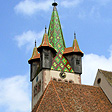CITÉ DU TRAIN - MULHOUSE
French National Railway Museum in Alsace
 One
of Europe’s finest collections of the railway past can be
found at the Cité du Train, France's Musee du Chemin de Fer, the
City of Trains in Mulhouse, Alsace. Celebrating 20 years, the museum
opened its fresh new exhibits in 2011. A museum for France’s SNCF
(Société Nationale des Chermin de Fer Francais) first opened
in Mulhouse in 1971, inspired by two rail enthusiasts Jean-Mathis Horrenberger
and Michael Doer, moving 13 steam engines from a former depot in Chalon
sur Marne. The collection has grown over the years, needing expanded
space. A second phase was opened in 1984 with six new tracks for the
rolling stock and engines. In 2005, the museum gained the new name Cité du
Train, administered by Culturespaces, with a new exhibit hall addition,
and now the Platforms of History exhibit has been unveiled.
One
of Europe’s finest collections of the railway past can be
found at the Cité du Train, France's Musee du Chemin de Fer, the
City of Trains in Mulhouse, Alsace. Celebrating 20 years, the museum
opened its fresh new exhibits in 2011. A museum for France’s SNCF
(Société Nationale des Chermin de Fer Francais) first opened
in Mulhouse in 1971, inspired by two rail enthusiasts Jean-Mathis Horrenberger
and Michael Doer, moving 13 steam engines from a former depot in Chalon
sur Marne. The collection has grown over the years, needing expanded
space. A second phase was opened in 1984 with six new tracks for the
rolling stock and engines. In 2005, the museum gained the new name Cité du
Train, administered by Culturespaces, with a new exhibit hall addition,
and now the Platforms of History exhibit has been unveiled.
 An indoor wonderland of steam rail, presenting a massive display of gleaming
and glorious old steam locomotives of France’s golden days of rail
travel. The engines exhibition begins with the “cutaway” Baltic
Nord steam engine, a massive locomotive once used to haul the luxury
Nord Express train which ran along the Baltic Coast. With its exposed
pipes which carry the steam to illustrate the inner workings of a steam
engine. Then lined on parallel tracks, a series of locomotives and rail
cars are laid out in the Platforms of History format. A series of platforms
with passenger coaches reveal a look back into the First Class, Second
Class and Third Class of rail travel from the past. “The Journey” represents
a Pullman Saloon car and sleeping car from the days of Agatha Christie
and the Simplon-Orient Express with rear projected scenery in the window.
An indoor wonderland of steam rail, presenting a massive display of gleaming
and glorious old steam locomotives of France’s golden days of rail
travel. The engines exhibition begins with the “cutaway” Baltic
Nord steam engine, a massive locomotive once used to haul the luxury
Nord Express train which ran along the Baltic Coast. With its exposed
pipes which carry the steam to illustrate the inner workings of a steam
engine. Then lined on parallel tracks, a series of locomotives and rail
cars are laid out in the Platforms of History format. A series of platforms
with passenger coaches reveal a look back into the First Class, Second
Class and Third Class of rail travel from the past. “The Journey” represents
a Pullman Saloon car and sleeping car from the days of Agatha Christie
and the Simplon-Orient Express with rear projected scenery in the window.
 Successive trains carry forward in history from the oldest authentic
steam engine to be found on the European continent, the 1844 Buddicom,
designed by English engineer William Buddicom, with the innovation of
drive pistons on the outside of the chassis, pulled passenger trains
between Paris and Rouen for 70 years. The golden Forquenot Steam Locomotive
sports the Imperial Eagle from the 19th Century. Steam engines grew more
powerful and efficient in the age of the Belle Epoque and up the outbreak
of the Great War in 1914. Electric engines began to appear about 1900,
and then diesel in the late 1940s.
Successive trains carry forward in history from the oldest authentic
steam engine to be found on the European continent, the 1844 Buddicom,
designed by English engineer William Buddicom, with the innovation of
drive pistons on the outside of the chassis, pulled passenger trains
between Paris and Rouen for 70 years. The golden Forquenot Steam Locomotive
sports the Imperial Eagle from the 19th Century. Steam engines grew more
powerful and efficient in the age of the Belle Epoque and up the outbreak
of the Great War in 1914. Electric engines began to appear about 1900,
and then diesel in the late 1940s.
 Some
stand out exhibits at the French National Railway Museum include, the
early Aigle Steam engine, the Streamlined Hudson 3232, and Pacific
Chapelon Nord, with its chocolate colored livery and yellow trim, one
of the most famous of French locomotives which served the Paris-Orleans
rail network, designed by Andre Chapelon, whose innovations doubled the
power and speed of locomotives in the 1930s and the Bugatti Presidential,
an answer to steam designed by car maker Ettore Bugatti, which was powered
by four Bugatti Royale engines (see Auto
Collection Schlumpf). With its
streamline nose, it was a precursor to todays TGV and held the world
speed record on 196kph in 1937.
Some
stand out exhibits at the French National Railway Museum include, the
early Aigle Steam engine, the Streamlined Hudson 3232, and Pacific
Chapelon Nord, with its chocolate colored livery and yellow trim, one
of the most famous of French locomotives which served the Paris-Orleans
rail network, designed by Andre Chapelon, whose innovations doubled the
power and speed of locomotives in the 1930s and the Bugatti Presidential,
an answer to steam designed by car maker Ettore Bugatti, which was powered
by four Bugatti Royale engines (see Auto
Collection Schlumpf). With its
streamline nose, it was a precursor to todays TGV and held the world
speed record on 196kph in 1937.
 A full life sized diorama wreck of a 1940s bombed armored transport train,
laying on its side among mangled rails illustrates the French Resistance
sabotage of World War Two. Also from the war years is a coach converted
to a hospital train from WWI. The glory of the Second Empire is represented
by “Empress Eugenie’s Parlor Car”, built in 1856 and
marked with the Imperial Arms. Rail coaches for French presidents – the
PR1, in Art Deco style with windows of Lalique glass (see Lalique
Crystal Museum). This car which carried Heads of State beginning in 1924 is tied
to the story of French President Paul Deschanel who got off in middle
of the night in only a nightshirt and got left behind. The Presidential
Rail Carriage built for Charles de Gaulle in 1954, sound-proofed and
body armored, which carried French Presidents until 1983. Kids will enjoy
sitting at the controls of the TGV Speed Record run. The TGV and Eurostar
High Speed trains are present in model form.
A full life sized diorama wreck of a 1940s bombed armored transport train,
laying on its side among mangled rails illustrates the French Resistance
sabotage of World War Two. Also from the war years is a coach converted
to a hospital train from WWI. The glory of the Second Empire is represented
by “Empress Eugenie’s Parlor Car”, built in 1856 and
marked with the Imperial Arms. Rail coaches for French presidents – the
PR1, in Art Deco style with windows of Lalique glass (see Lalique
Crystal Museum). This car which carried Heads of State beginning in 1924 is tied
to the story of French President Paul Deschanel who got off in middle
of the night in only a nightshirt and got left behind. The Presidential
Rail Carriage built for Charles de Gaulle in 1954, sound-proofed and
body armored, which carried French Presidents until 1983. Kids will enjoy
sitting at the controls of the TGV Speed Record run. The TGV and Eurostar
High Speed trains are present in model form.
Visiting the Cite du Train
 The museum is open from 10am to 6pm from April to November, 10am to 5pm,
November to March. Admission is €10.50 for adults and €8.20
reduced. Children under 7 are free. A combined ticket to also visit the
Cite de l”Automobile across town is €12.80. and the Electropolis
power museum next door ( EDF Electropolis). An audio guide is included with admission. Have
a lunch at the train themes Brasserie Mistral, or grab a snack from the
Trans Europe café window. © Bargain
Travel Europe
The museum is open from 10am to 6pm from April to November, 10am to 5pm,
November to March. Admission is €10.50 for adults and €8.20
reduced. Children under 7 are free. A combined ticket to also visit the
Cite de l”Automobile across town is €12.80. and the Electropolis
power museum next door ( EDF Electropolis). An audio guide is included with admission. Have
a lunch at the train themes Brasserie Mistral, or grab a snack from the
Trans Europe café window. © Bargain
Travel Europe
Other historical sites managed by CultureSpaces
Chateau
des Baux Provence
Roman
Theater Antique Orange
Waterloo Battle Museum Belgium
Find best hotel and travel deals in Alsace on TripAdvisor
Web Info
Cité du Train
These articles are copyrighted and the sole property of Bargain Travel Europe and WLPV, LLC. and may not be copied or reprinted without permission.
See Also:
GERMAN TECHNIK MUSEUM - BERLIN
MONTENVERS RACK RAILWAY - CHAMONIX

